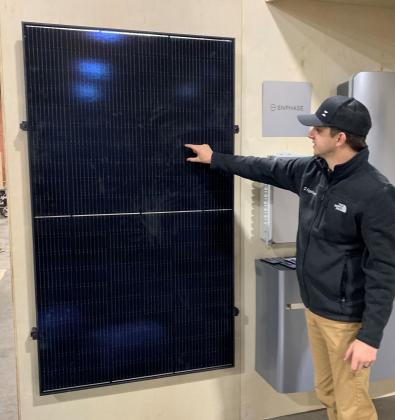OKLAHOMA CITY – A staff writer for The Atlantic magazine opined recently that Russia’s invasion of Ukraine, and the response of the united West, will nudge more consumers away from gasoline-powered vehicles and toward electric vehicles as the cost of carbon-based fuel spikes.
At least one Oklahoma company is prepared for that transition.
EightTwenty provides energy equipment and “solutions,” CEO and cofounder Tony Capucille said.
The company’s name is derived from the fact that it takes 8 minutes, 20 seconds for light from the sun to reach Earth, he explained.
EightTwenty was founded last year and is based in Oklahoma City. The company sells EV charging stations for businesses and residences alike.
“We’ve installed several dozen” residential EV charging stations, said Capucille (pronounced Cap-Uh-Selly). “It’s a new market.” EightTwenty is working with Wheeler Homes and Home Creations, who are “giving homebuyers the option,” he said. “They want to get ahead of the curve.”
Charging stations can be powered from solar panels and/or the electric grid. Solar is gradually gaining in popularity because Oklahoma is the sixth-most sunlit state in the nation, and Oklahoma City is ranked the 32nd sunniest city in the U.S., Capucille said.
EightTwenty has begun installing EV charging stations in new homes “because it costs so much more to do it after-the-fact,” he said.
The average cost for a Level 2 charger is $700, but if a 240-volt outlet is subsequently installed to maximize the power of that charger “you’ll spend about $2,000,” Capucille said. The installed cost for a 240V outlet can range from $500 to $1,500, “depending on the existing conditions and how far the outlet is from the electrical panel.”
A level 1 charger is a typical 110-volt unit. Level 2 is a residential 240V, and the third model is a “fast charge,” which is the kind of stations EightTwenty installs.
Installation of EV charging equipment in an Oklahoma City residence requires an electrical permit issued by City Hall.
Although tax credits for EV charging stations expired at the end of last year, EV vehicles still qualify for tax credits of $2,500 to $7,500, according to the Internal Revenue Service.
For those whose charging stations are powered from solar panels, the cost of that equipment depends on factors such as the slope of the roofline, the location on the roof, “and how much power you want to use that’s generated by the panels,” Capucille said.
Solar panels that EightTwenty installs on homes range from 370 to 405 watts, while its commercial panels range from 435 to 530 watts.
Modern solar panels last more than three decades, Capucille said, and Sam Pearson, a solar consultant with EightTwenty, said solar panels can withstand hailstones up to half an inch in diameter.
Prior to the recent price spike at the gas pump, Capucille said a fill-up at $2/gallon for gas would cost the equivalent of $1/gallon for an electric vehicle. A three-hour trip to Grand Lake would cost about $20 in gasoline, $7 if the battery were charged at a house with an EV station, or $3 if charged from solar panels, he estimated.
A little over 3,400 electric vehicles were registered in Oklahoma as of nine months ago. Automotive News reported last August that electric vehicles constituted 2.5% of new vehicle registrations.
Oklahoma has “the most robust EV infrastructure in the nation, per capita, in terms of public charging stations,” Capucille said. More than 1,000 public charging stations have been installed throughout the state, mostly in urban areas such as Oklahoma City and Tulsa and along major highways, but they’re scarce in rural areas.
Advance planning for a trip is critical for motorists driving an electric vehicle, Capucille emphasized.
Efforts are underway to establish a network of EV charging stations throughout Oklahoma so that motorists anywhere in the state will not have to travel farther than 50 miles to recharge their vehicle’s battery.
To accomplish that goal, the state will be allocated $66 million over five years via the Infrastructure and Investment Jobs Act that President Biden signed last year. The Oklahoma Department of Transportation has until Aug. 1 to inform federal officials how those funds will be spent.
Some electric vehicles need perhaps six hours overnight to recharge the battery, Capucille said. Charging stations “won’t be as fast as a gas pump,” he conceded, “but you can get 60 to 80 miles on a 20-minute charge.”
Some EVs traveling at 60 miles per hour can get 100 to 300 miles on an electric charge, he said.
Capucille, 41, formerly was the president and chief executive officer of Heartland Payment Systems. He left Heartland in 2019 after 17 years.


